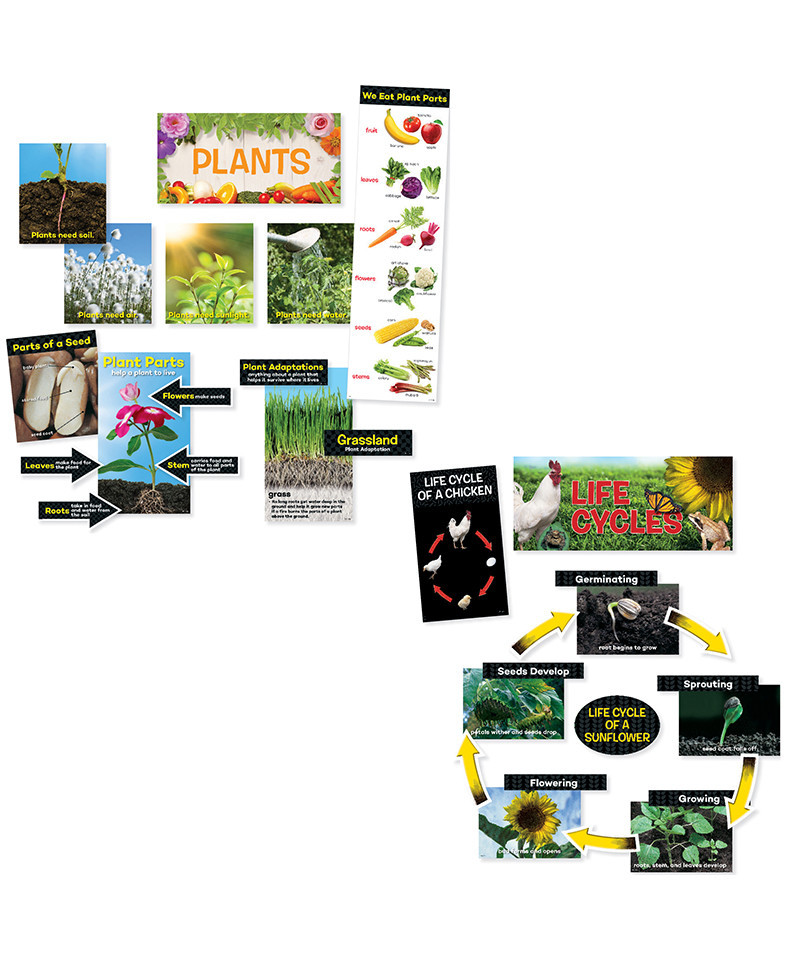Optimize learning by having students experience science concepts in a variety of ways. The interactive, manipulative design of this set provides numerous ways to present information! Use this science mini bulletin board to complement or enhance your science curriculum. Introduce science concepts and vocabulary, develop skills in learning centers, instruct small groups, and more! This resource provides the pictorial support needed to help nonreaders, struggling readers, and English Language Learners understand and comprehend each science concept.
Optimize learning by having students experience science concepts in a variety of ways. The interactive, manipulative design of this set provides numerous ways to present information! Use this science mini bulletin board to complement or enhance your science curriculum. Introduce science concepts and vocabulary, develop skills in learning centers, instruct small groups, and more! This resource provides the pictorial support needed to help nonreaders, struggling readers, and English Language Learners understand and comprehend each science concept. Set contains photographs and informative text.
This set includes:
6991 Life Cycles Mini Bulletin Board set: Activity insert guide includes list of relevant science standards, as well as, a list of academic vocabulary and their definitions. Guide also includes display ideas, classroom activities, and related learning standards about science content-based mini bulletin boards.
Use this 48-piece Life Cycles Mini Bulletin Board with Gr. K-2 students to help them:
Understand common animal and plan life cycles
Comprehend the stages in the lifecycle of the frog, butterfly, and sunflower
Identify the correct sequence in the life cycle of the frog, butterfly, and sunflower
Color photographs cover the following topics:
Lifecycles of frog: tadpole (breathes with gills), growing tadpole (with hind legs), emergent frog (develops front legs and lungs), and adult frog (tail is gone and lives on land and water.
Lifecycle of butterfly: Eggs (laid on a leaf), larva/caterpillar (eats and grows), pupa/chrysalis (changes into adult), and adult (emerges after two weeks).
Lifecycle of sunflower: germinating (root begins to grow), sprouting (seed coat falls off), growing (roots, stem, and leaves develop), flowering (bud forms and opens), and seeds develop (petals wither and seeds drop.
6988 Plants Mini Bulletin Board Set: Mini bulletin board set also includes an instructional guide with display ideas, classroom activities, and related learning standards.
Set contains color photographs and informative text.
Use this 30-piece Plants Mini Bulletin Board with Gr. K-2 students to help them:
Learn what plants need to survive
Identify the parts of a plant and their functions
Learn about edible plants
Describe the life cycle of a plant
Comprehend plant habitats and adaptations
Identify parts of a seed
Describe how seeds travel
Color photographs cover the following topics:
Parts of a seed: baby plant, stored food, seed code
How seeds travel: pop, fly, carry and bury, stick
Plant parts: roots, stem, leaves, flowers
Plant life cycle: germinating, sprouting, growing, flowering
Plant adaptations: grassland (grass), rain forest (bromeliad), desert (saguaro cactus), wetlands (mangrove tree)
Edible plant parts


